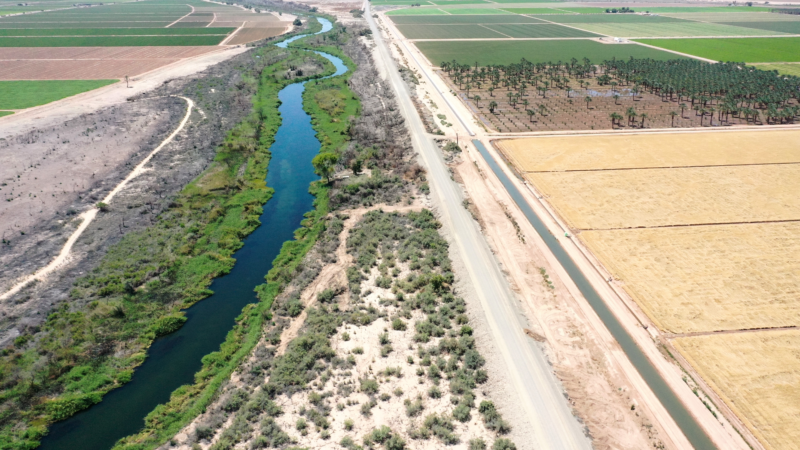Trump funding freeze includes payments to keep the Colorado River flowing
The first executive order President Trump signed in his second term, “Unleashing American Energy,” wouldn’t seem to have a direct impact on how much water is in the Colorado River, at least in the short term.
The order, signed the first day Trump took office, aims to “unleash America’s affordable and reliable energy and natural resources,” by ending “burdensome and ideologically motivated regulations.”
But the order also says, “All agencies shall immediately pause the disbursement of funds appropriated through the Inflation Reduction Act of 2022.”
While some of those funds were earmarked to prop up renewable energy, at least $4 billion was set aside to protect the flow of the Colorado River, which supplies about 40 million people with drinking water, is the foundation for a massive agricultural economy across the Southwest, and generates significant hydroelectric power.
The Colorado River is shrinking
The river is shrinking due to climate change, which means the nation’s two largest reservoirs, Lake Mead and Lake Powell, created by dams on the Colorado River, have reached record low levels in recent years amid a megadrought spanning more than two decades. If water levels fall much lower, they could lose the ability to generate hydropower within the massive dams that hold them back, or even lose the ability to pass water downstream.

The 2022 Inflation Reduction Act allowed President Biden to designate $4 billion for Colorado River programs, including big sums for programs that pay farmers, cities and Native American tribes to conserve Colorado River water and, instead, leave it in those reservoirs. The payments are compensation for money they can’t make by using their water to grow crops or for other uses.
A lot of the IRA money has already been delivered, but Bart Fisher, who sits on the board of the Palo Verde Irrigation District in California, is worried about what will happen if it goes away.
“If there’s no funding,” he said, “there will be no conservation.”
Farmers in Palo Verde use Colorado River water to grow cattle feed and vegetables in the desert along the Arizona border. Fisher said they want to be active participants in protecting the river, but they stand to lose money if they use less water and grow fewer crops.
“You won’t see any ag producer in any district willing to sacrifice revenue from their normal ag production for nothing,” he said.
The river’s uncertain future
In the current funding cycle, landowners in Fisher’s irrigation district alone are getting about $40 million in exchange for cutting back on their water use. No one knows how much funding, if any, will be delivered in the next cycle, which starts in August. Fisher said farmers are already thinking about their budgets for the next growing season.
“At the moment, it’s unnerving to think that maybe come August the first, all of our plans will need to suddenly change,” he said.
Some water experts say they are surprised to see these water conservation programs frozen by Trump’s executive order, since they do not appear to be in line with the president’s stated priorities of eliminating diversity programs and boosting domestic energy production.
“These are not woke environmental programs,” said Anne Castle, who held federal water policy roles during the Biden and Obama administrations. “These are essential to continued ability to divert water.”
Water users whose grants have been paused said they are asking the federal government for more information and getting little in the way of answers. The federal agencies in charge of Western water did not respond to NPR’s requests for comment.
Conservation programs like the one sending money to California farmers have been key in boosting water supplies in major reservoirs. That is no small feat, as leaders of the states that use Colorado River water are caught in a legal standoff about how to share it going forward. They appear to be making little progress as they meet behind closed doors ahead of a 2026 deadline.

“Having this appropriated funding suddenly taken away undoes years and years of very careful collaboration among the states in the Colorado River Basin,” Castle said, “and threatens the sustainability of the entire system.”
In addition to those water conservation programs, the Inflation Reduction Act set aside hundreds of millions of dollars for projects aimed at keeping Colorado River tributaries clean and healthy. Conservation groups, small nonprofits, Native American tribes, and local governments were assigned federal money for a bevy of projects that included wildfire prevention and habitat restoration.
Sonja Chavez, general manager of the Upper Gunnison River Water Conservancy District, was expecting that money to make its way to her group for river improvement projects in Western Colorado.
“If there isn’t some resolution to the freeze or some additional guidance on what’s going to happen for folks,” she said, “we may have to put our entire programs on pause.”
Smaller watershed groups and their projects to restore and improve small sections of rivers are uniquely dependent on money from the federal government.
“Federal funding is critical because that’s the big money,” said Holly Loff, a grant writer in Western Colorado and the former director of the Eagle River Watershed Council. “No one can really compete with those big dollars, or very few other entities besides the federal government can fund at those levels.”
Small groups dependent on that federal funding have been scrambling to come up with contingency plans since it has been paused, and some of their leaders say the gap would be difficult to fill with money from donors or local governments.
Loff said a continued pause on funding would cause a lot of financial pain for communities near the Colorado River, such as those with economies dependent on water-based recreation, and people far away, like those who buy produce that is grown with Colorado River water.
“Our economy is going to be impacted,” she said. “It’s just far reaching. And I really can’t think of how anyone can avoid being impacted.”
Former Sean Combs employee Capricorn Clark says he kidnapped her
On Tuesday, Clark, who worked for Combs for more than a decade, accused him of kidnapping her during a chaotic 2011 episode involving his former girlfriend, Cassie Ventura, and the rapper Kid Cudi.
Almost 200,000 Palestinians displaced by latest Israeli military offensive
Israel has ordered tens of thousand of Gazans to move to zone in the south
Susan Brownmiller, whose landmark book changed attitudes on rape, dies at 90
In 1975, Against Our Will: Men, Women and Rape explored pernicious cultural and legal attitudes about rape and helped debunk the long-held view that victims were partly to blame.
A video of the French president’s wife shoving him went viral. Here’s why it matters
Macron said that the video depicts the couple "joking" and dismissed it as part of a disinformation campaign. Experts say Russian accounts are trying to undermine his image as a strong advocate for the West.
US Sen. Tommy Tuberville announces 2026 bid for Alabama governor
His announcement on the Will Cain Show on Fox News followed weeks of speculation, and associates saying Tuberville planned to enter the race. The former coach is expected to be a formidable entry in the governor’s race.
55-year-old Kami Rita Sherpa breaks his own record: climbing Mount Everest 31 times
Lumping his 31 feats together, Kami Rita Sherpa has climbed nearly 90,000 feet above sea level on the famous peak. He first climbed to the top of the world's highest mountain in 1994.








